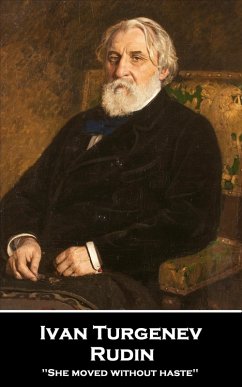Ivan Sergeyevich Turgenev was born on 9th November 1818 in Oryol, Russia to parents from the nobility. He and his two brothers were raised by their mother on the family estate. Surrounded by foreign governesses he became fluent in French, German, and English. Their father spent little time with them and this undoubtedly had an effect on his sons. When he was nine the family moved to Moscow to give their children a better education.
Turgenev studied for a year at the University of Moscow and then at the University of St Petersburg to study Classics, Russian literature, and philology. During that time his father died from kidney stone disease. In 1838 Turgenev studied philosophy and history at the University of Berlin for 3 years before returning to St Petersburg for his master's.
He started his career with the Russian Civil Service and it was only in 1852, after several earlier publications, that he made his name with his short story collection, 'A Sportsman's Sketches', based on his observations of peasant life and nature.
That same year he wrote an obituary for Nikolai Gogol: "Gogol is dead!... What Russian heart is not shaken by those three words?... He is gone, that man whom we now have the right (the bitter right, given to us by death) to call great." The St Petersburg censor banned publication but the Moscow censor allowed it. He was dismissed but Turgenev was held responsible and imprisoned for a month, and then exiled to his country estate.
Along with many other intellectuals Turgenev left Russia and settled in Paris in 1854. During this period he wrote his finest stories and four novels.
Alexander II ascended the Russian throne in 1855, and the political climate relaxed. Turgenev returned home.
'Fathers and Sons', Turgenev's most famous and enduring novel, appeared in 1862. Its leading character is considered the first 'Bolshevik' in Russian literature. But the hostile reaction prompted Turgenev's decision to again leave Russia.
His health declined during his later years. In January 1883, an aggressive malignant tumor was removed but by then it had metastasized in his upper spinal cord, causing him intense pain in his final few months of life.
Ivan Turgenev died on 3rd September 1883 of a spinal abscess, a complication of the metastatic liposarcoma, in his house near Paris. He was buried in St Petersburg.
Turgenev studied for a year at the University of Moscow and then at the University of St Petersburg to study Classics, Russian literature, and philology. During that time his father died from kidney stone disease. In 1838 Turgenev studied philosophy and history at the University of Berlin for 3 years before returning to St Petersburg for his master's.
He started his career with the Russian Civil Service and it was only in 1852, after several earlier publications, that he made his name with his short story collection, 'A Sportsman's Sketches', based on his observations of peasant life and nature.
That same year he wrote an obituary for Nikolai Gogol: "Gogol is dead!... What Russian heart is not shaken by those three words?... He is gone, that man whom we now have the right (the bitter right, given to us by death) to call great." The St Petersburg censor banned publication but the Moscow censor allowed it. He was dismissed but Turgenev was held responsible and imprisoned for a month, and then exiled to his country estate.
Along with many other intellectuals Turgenev left Russia and settled in Paris in 1854. During this period he wrote his finest stories and four novels.
Alexander II ascended the Russian throne in 1855, and the political climate relaxed. Turgenev returned home.
'Fathers and Sons', Turgenev's most famous and enduring novel, appeared in 1862. Its leading character is considered the first 'Bolshevik' in Russian literature. But the hostile reaction prompted Turgenev's decision to again leave Russia.
His health declined during his later years. In January 1883, an aggressive malignant tumor was removed but by then it had metastasized in his upper spinal cord, causing him intense pain in his final few months of life.
Ivan Turgenev died on 3rd September 1883 of a spinal abscess, a complication of the metastatic liposarcoma, in his house near Paris. He was buried in St Petersburg.
Dieser Download kann aus rechtlichen Gründen nur mit Rechnungsadresse in D ausgeliefert werden.


